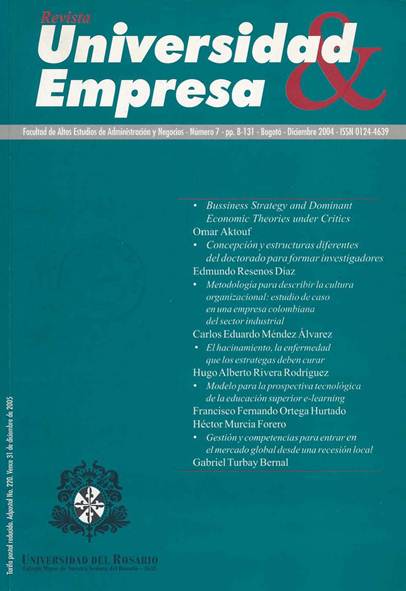Business strategy and dominant economic theories under critics.
Barra lateral del artículo
Contenido principal del artículo
En este ensayo el autor analiza o más exactamente critica, la esencia del pensamiento “estratégico” y los modelos de gobierno corporativo de tipo anglosajón, el pensamiento neoliberal dominante que predomina en la escena académica y gerencial, dibujando simultáneamente los escritos que sobre este tema han predominado desde el punto de vista histórico, epistemológico y metodológico. El autor se refiere específicamente al “Porterismo”, presentando una profunda crítica, tanto a las teorías de gerencia “estratégica” como a los autores más notables en este campo, principalmente, Michael Porter.
Descargas
Omar Aktouf, HEC-Montreal
Full Professor, HEC-Montreal.Agayo, R. (1990). Dr. Deming: The American who taught the Japanese about. New York: Simon and Schuster Inc.
Aktouf, O. (1984a). Le management et son enseignement: entre doctrine et science? Gestion, april, pp. 44-49.
Aktouf, O. (1984b). La mpethode des cas et l’enseignement du management: pédagogie ou conditionment? Gestión, april, pp. 37-42.
Aktouf, O (1992). A méthode de case en gestión face au modele et a l’expeérimentation en science: une interrogation de la fonction heuristique des cas dans l’enseignament de la gestión. Revue Organisation. Université du Québec a Chicoutime, March 1992, pp. 53-64.
Aktouf, O. (1996) Traditional management and beyond: a matter of renewal. Montreal: Gaëtan Morin.
Albert, M. (1991). Capitalisme contre capilalisme. Paris: Seuil.
Argyres, N., & McGahan, A. (2002a). Introducion: Michael Porter’s Competitive Strategy. Acadmey of Managemente Executive. 16(2), pp. 41-42.
Argyres, N., & McGahan, A. (2002b). An interview with Michael Porter. Academy of Managemente Executive, 16(2), pp. 43-52.
Arrow, K.J. (1983). General equilibrium. Cambridge: Belknap Press, 1983.
Astely, W.G., & Fombrun, C. (1983). Beyond Corporate Strategy. The Journal of Business Strategy, Spring.
Barney, B. (2002). Strategic Management: From Informed conversation to academic discipline. Academy of Management executive. 16(2).
Bartlett, C., & Sumantra, G. (2002). Strategic Advantage. Executive Excellence, July.
Boyer, B., & Freyssenet, M. (2000). Les modeles productifs. Paris. La découverte.
Brandenburger, A.M., Nalebuff, B.J. (1995), Co-opetition. New York: Currency Doubleday.
Brandenburger, A. (2002). Porter’s Added value: High indeed! Academy of Management Executive, 16(2).
Debreu, G. (1966). General equilibrium theory. Cheltenham: E. Elgar.
Galbraith, J.K. (1967). The New Industrial State. Boston: Houghton Mifflin.
Habermas, J. (1990) Moral consciousness and communicative action. Cambridge: MIT Press.
Hamel, G.D., & Prahalad, C.K. (1989). Collaborate with your partners-and Win. Harvard Business Review, Jan. / Feb.
Haynes, C., & Nembhard, J.G. (1999). Cooperative Economics-A community Revitalization Strategy. Review of Black Political Economy, Summer.
Klein, J. (2000). A critique of competitive advantage. Critical Management Conference. Machester, July 2001.
Knights, D., & Morgan, G. (1991). Strategic discourse and subjectivity: towards a critical analysis or corporate strategy in organizations. Organization Studies, 12(2).
Mintzberg, H.B., & Ahlstrand, J. (1998) Strategic Safari. London: Prentice hall.
Moore, J.F. (1996a). The death of competition: leadership & strategy in the age of business ecosystems. New York: Harper-Collins.
Moore, J.F. (1996b). Give Coevolution a sporting chance. Upside, Sept.
Morgan, G. (1986). Images of Organizations. Beverly Hills: Sage Publications.
Nonaka, I., & Takeuchi, H. (1995). The knowledge-creating company. New York: oxford University Press.
Ohmae, k. (1989). The Global logic of Strategic Alliances. Harvard Business Review. Mar. / April.
Pfeffer, J. (1994). Competitive Advantage Through People. California Management Review. Barkeley, Winter.
Pfeffer, J. (1999). Putting people first for organizational success. The Academy of Management Executive, May
.
Popper, k. (1972) Objective knowledge an evolutionary approach, Oxford: Clarendon Press.
Porter, M. (1979). How competitive Forces Shape Strategy. Harvard Business Review. March/ April.
Porter, M. (1980). Competitive Strategy, New York: The Free Press.
Porter, M. (1985a). Competitive advantage. New York: The Free Press.
Porter, M. (1985b). Technology and competitive advantage. The Journal of Business Startegy. Winter.
Porter, M. (1990). The Competitive advantage of nations. New York: The Free Press.
Porter, M. (1991). Towards a Dynamic Theory of Strategy. Strategic Management Journal. Winter.
Porter, M. (1995a). The competitive advantage of the inner city. Harvard Bussiness review. May.
Porter, M. (1995b). An economic strategy for america’s inner cities: Addressing the controversy. Review of Black Political Economy, Fall 1995/ winter 1996.
Porter, M. (1997). Creating Advantage. Executive Excellence, December.
Portern M., & Takeuchi, H. (1999). Fixing what reallyt ails Japan. Foreign Affairs, May/June.
Porter, M. (2001a). Innovation: Location Matters. MIT SLOAN Management Review, Summer.
Porter, M. (2001b). Strategy and the internet. Harvard Buysiness Review, March.
Powell, C.P. (1995). Total Quality Management as Competitive Advantage: A review and Empirical Study. Strategic Management Journal. , January.
Prahald, C.K., & Haeml, G. (1990). The Core Competence of the corporation. Harvard Business Review, May-June.
Rostow, W. W. (1960). The stages of economic growth: a Non-manifesto. Cambridge: The university press.
Smith, A. (1973). An inquiry into the nature and causes of the wealth of nations. Mich: Ann Arbor.
Stalk, G., Evans, P., & Shulman, L.E. (1992). Competing on capabilities: the New rules of corporate strategy. Harvard Business Review. March-April.
Teece, D.J., Pizano, G., & Shuen, A. (1991).Dynamic capabilities and stretegic management. Working paper, Center for Research of Californiam Berkeley.
Todd, E. (1998). L’illusion ‘economique. Paris: Gallimard.
Walrasm, L. (1952). Elements d’economie politique pure: theorie de la rhicesse sociale. Paris: librarie generale de droit et de jurisprudence.
Detalles del artículo
Artículos más leídos del mismo autor/a
- Omar Aktouf, The false expectations of Michael Porter's strategic management framework. , Revista Universidad y Empresa: Vol. 6 Núm. 6 (2004)



